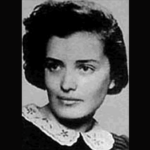Quote:
What can we do apart from resisting? (…) It will not be easy to avenge their crimes against our people, for every step we take will be met with massive and arbitrary retribution. (…) But the destiny of our people on this earth is already certain. (…) We can either die with them or try to avenge their death. Our revenge will have to be unbridled and merciless.
Source:
Jochen Kast, Bernd Siegler & Peter Zinke (1999): Das Tagebuch der Partisanin Justyna. Jüdischer Widerstand in Krakau. Berlin: Elefanten Press. The year (1943) is an approximation.
Author Bio:
Gusta Dawidsohn-Draenger (1917-1943) was born in Kraków to an orthodox Jewish family. After the outbreak of World War II, she played a key role in coordinating Jewish resistance to the Nazis. Together with others - including her husband Shimshon Draenger - she smuggled weapons, organised hiding places and fought with partisans in the surrounding forests. In November 1943, the Germans murdered her and her husband. Between January and March 1943, she had written down her extensive memories on a roll of toilet paper in prison.
Context:
 This quote, in which Gusta Draenger-Dawidson cites her husband Shimshon Draenger, is a testament to Draenger-Dawidson's memory of armed resistance to the Nazis in Poland. Jewish resistance to the Nazis, often carried out by individuals and small groups, is rarely mentioned in history books. There were also uprisings and revolts in the Warsaw Ghetto, Auschwitz, Treblinka, Bialystok and Sobibor. The largest resistance group with around 1,200 members was the Jewish partisan Tuvia Bielski in Belarus. The forms of resistance were numerous: they ranged from leaflets and newspapers, the running of theatres and schools, to food smuggling and the forging of documents. An estimated 6 million Jews died during the Second World War from 1939-1945 as a result of the Shoah, the Nazi genocide.
This quote, in which Gusta Draenger-Dawidson cites her husband Shimshon Draenger, is a testament to Draenger-Dawidson's memory of armed resistance to the Nazis in Poland. Jewish resistance to the Nazis, often carried out by individuals and small groups, is rarely mentioned in history books. There were also uprisings and revolts in the Warsaw Ghetto, Auschwitz, Treblinka, Bialystok and Sobibor. The largest resistance group with around 1,200 members was the Jewish partisan Tuvia Bielski in Belarus. The forms of resistance were numerous: they ranged from leaflets and newspapers, the running of theatres and schools, to food smuggling and the forging of documents. An estimated 6 million Jews died during the Second World War from 1939-1945 as a result of the Shoah, the Nazi genocide.Further Reading:
*United States Holocaust Memorial Museum: Armed Jewish Resistance: Partisans.
Year:
1943